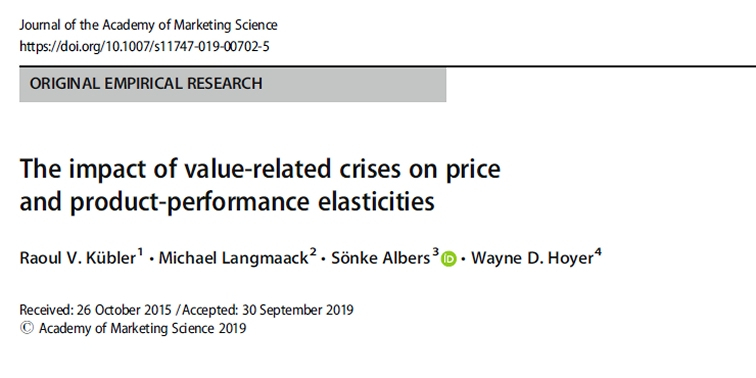Professor Kübler publishes new study showing how value-crises decrease customer’s price and product performance sensitivities

Together with colleagues Michael Langmaack and Sönke Albers from Kühne Logistics University and MCM VIP and UT Austin Professor Wayne Hoyer, Raoul Kübler managed to publish a research article in the prestigious Journal of the Academy of Marketing Science (ranked as A by Journal) that demonstrates that value-crises such as child labor, environmental pollution or tax evasion tremendously decrease consumers’ price and product performance sensitivities.
“This finding makes value-crises very much different from other forms of corporate crises such as performance-related crises like product-recalls, where previous research showed that consumers become more price-sensitive,” explains Professor Kübler. The study relies on 8 different choice-experiments, which all consistently find a tremendous reduction of price sensitivity as well as the product performance sensitivity for the value-violating company independent from the type of violation, the violation strength, and the product category. The international research team suspects that moral outrage triggers this reaction, as they also find with the help of a text mining study relying on more than 300,000 user comments from Facebook that value-crises cause significantly more moral outrage than comparable performance crises.
“The interesting thing is, that the decrease of the price and performance sensitivities is not only true for the violator but also for the non-violating other market participants” Professor Kübler further explains. This spill-over effect however does not come from consumers who are suspecting similar companies to behave similarly unethical, but from the fact that consumers pay less attention to price and product performance than to ethical compliance. The study shows that consumer who are trying to avoid the violating product, will be more likely to accept higher prices and or lower product performance levels from non-violating competitors.
The empirical finding brings important implications for managers responsible to secure a company’s future after a value-crisis. Until know a lot of managers believed that sales can be re-stimulated post crisis similar to a product-harm crisis by lowering prices or offering better service or more product performance. Our research however points out that this is the wrong way. Instead of investing in price campaigns, company should do their best to regain faith into the company’s morality before further engaging in any marketing activities.
The publication can be downloaded here.

